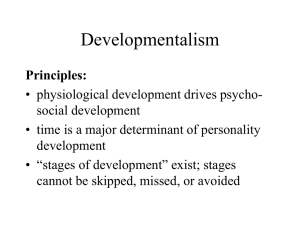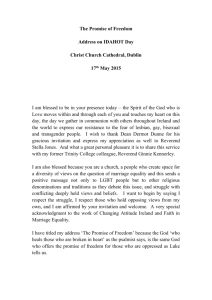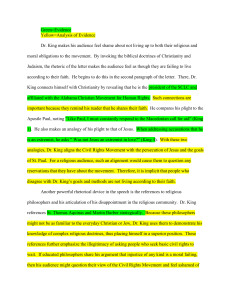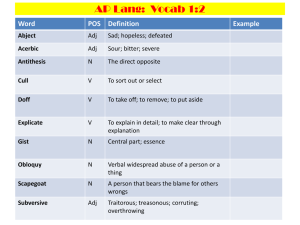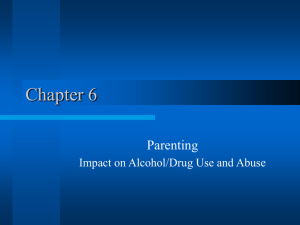Guilt and Shame
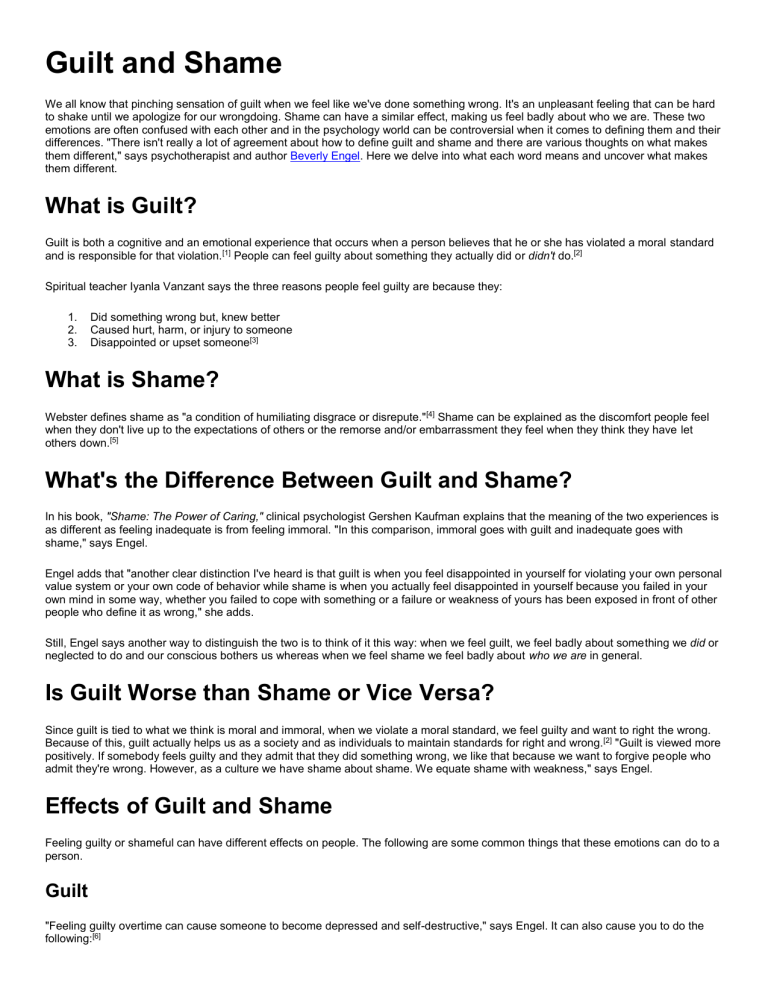
Guilt and Shame
We all know that pinching sensation of guilt when we feel like we've done something wrong. It's an unpleasant feeling that can be hard to shake until we apologize for our wrongdoing. Shame can have a similar effect, making us feel badly about who we are. These two emotions are often confused with each other and in the psychology world can be controversial when it comes to defining them and their differences. "There isn't really a lot of agreement about how to define guilt and shame and there are various thoughts on what makes them different," says psychotherapist and author Beverly Engel . Here we delve into what each word means and uncover what makes them different.
What is Guilt?
Guilt is both a cognitive and an emotional experience that occurs when a person believes that he or she has violated a moral standard and is responsible for that violation.
[1] People can feel guilty about something they actually did or didn't do.
[2]
Spiritual teacher Iyanla Vanzant says the three reasons people feel guilty are because they:
1.
Did something wrong but, knew better
2.
Caused hurt, harm, or injury to someone
3.
Disappointed or upset someone [3]
What is Shame?
Webster defines shame as "a condition of humiliating disgrace or disrepute." [4] Shame can be explained as the discomfort people feel when they don't live up to the expectations of others or the remorse and/or embarrassment they feel when they think they have let others down.
[5]
What's the Difference Between Guilt and Shame?
In his book, "Shame: The Power of Caring," clinical psychologist Gershen Kaufman explains that the meaning of the two experiences is as different as feeling inadequate is from feeling immoral. "In this comparison, immoral goes with guilt and inadequate goes with shame," says Engel.
Engel adds that "another clear distinction I've heard is that guilt is when you feel disappointed in yourself for violating your own personal value system or your own code of behavior while shame is when you actually feel disappointed in yourself because you failed in your own mind in some way, whether you failed to cope with something or a failure or weakness of yours has been exposed in front of other people who define it as wrong," she adds.
Still, Engel says another way to distinguish the two is to think of it this way: when we feel guilt, we feel badly about something we did or neglected to do and our conscious bothers us whereas when we feel shame we feel badly about who we are in general.
Is Guilt Worse than Shame or Vice Versa?
Since guilt is tied to what we think is moral and immoral, when we violate a moral standard, we feel guilty and want to right the wrong.
Because of this, guilt actually helps us as a society and as individuals to maintain standards for right and wrong.
[2] "Guilt is viewed more positively. If somebody feels guilty and they admit that they did something wrong, we like that because we want to forgive people who admit they're wrong. However, as a culture we have shame about shame. We equate shame with weakness," says Engel.
Effects of Guilt and Shame
Feeling guilty or shameful can have different effects on people. The following are some common things that these emotions can do to a person.
Guilt
"Feeling guilty overtime can cause someone to become depressed and self-destructive," says Engel. It can also cause you to do the following: [6]
Try hard to make things right by overworking and over-giving in an attempt to to make everyone happy
Ignore your needs and desires in order to avoid upsetting others
Become overly sensitive to making right decisions in your personal actions, choice of words and decisions
Become fearful of doing or saying something wrong to the point where you give in and choose to stay within the status quo
Lack decision-making skills since you always want to make the "right" choice
Create self-denial by always putting other people first
Become emotionally closed off and only able to see the negative aspects of life
Use the discomfort of guilt to motivate you to change things in your life to eliminate the guilt
Use guilt as a mask for your low self-esteem
Make irrational decisions based on the guilt
Shame
"Shame is the most destructive of human emotions. Shame destroys a person's self-esteem and sense of who they are and causes people really serious problems. It's core issue of addiction and can cause other issues like suicide , depression and anger ," says Engel.
People with shame may also experience the following: [6,7]
Have issues with intimacy and therefore have superficial relationships
Find themselves in relationships with people who encourage their ongoing experience of low self-worth
Isolate themselves from others
Have self-condemning attitudes and talk negatively about themselves, which can lead to self-loathing and self-sabotaging behavior
Tend to bring others down in an attempt to make themselves feel better
Seek perfection to avoid future shame
Aim for power in attempt to feel more valuable
Blame others for their faults and problems to avoid shame
Be overly nice to others in hopes to prove their worth
How to Overcome Feelings of Guilt and Shame
Since guilt often arises from something you've done or think you've done, Engel says an easy remedy is to apologize for the wrongdoing. "But shame can be something that was done to you. People who have been abused feel shame and they didn't do anything wrong so shame is a more difficult feeling to get rid of," she adds.
Engel believes that teaching people self-compassion is a way to heal shame. Directors of the Conflict Information Consortium at the
University of Colorado agree. "By showing people empathy and caring, we indicate that doing something wrong does not necessarily reflect on the person as a whole. By differentiating between the action and the actor, we can help prevent shame and its negative connotations, while still encouraging a healthy sense of right, wrong, and guilt when necessary."
References
1.
Encyclopedia of Psychology.
Guilt. 2nd ed. Ed. Bonnie R. Strickland. Gale Group, Inc., 2001.
2.
The Beyond Intractability Project, The Conflict Information Consortium, University of Colorado. Guilt and Shame.
Retrieved
September 28, 2013, from http://www.beyondintractability.org/essay/guilt-shame.
3.
Oprah Winfrey Network. The 3 Reasons People Feel Guilty.
Retrieved September 30, 2013. http://www.oprah.com/ownsupersoulsunday/blogs/The-3-Reasons-People-Feel-Guilty
4.
Webster. Shame.
Retrieved September 20, 2013, from http://www.merriam-webster.com/dictionary/shame.
5.
Anxiety Care UK. Guilt and Shame.
Retrieved September 30, 2013, from http://www.anxietycare.org.uk/docs/guilt.asp#shame.
6.
Mental Illness Fellowship of Australia Inc. Understanding guilt. [PDF] Retrieved September 28, 2013, from http://www.mifa.org.au/sites/www.mifa.org.au/files/documents/XUnderstanding%20Guilt.pdf.
7.
Nicholls State University. Effects of Shame: Unhealthy Relationships.
Retrieved September 22, 2013, from http://www.nicholls.edu/counseling/newsletters/effects-of-shame-unhealthy-relationships/.

